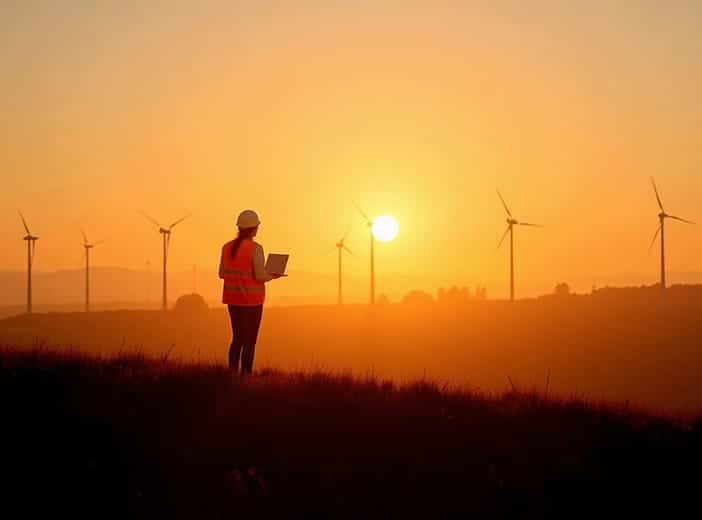Open data lessons for the energy sector
Open data is essential to creating smart grids and decarbonizing the energy sector. Our blog brings together best practice from leaders such as UK Power Networks, Enedis, Elia and EDP to demonstrate how open data can drive transformation across the sector.

Meeting the challenges of the energy sector relies on data – and in particular sharing it internally and externally with a wide range of partners. It is essential to successfully digitizing operations, enabling decarbonization and breaking down barriers that prevent collaboration across the energy ecosystem.
What challenges do energy players currently face?
The pressing need to reduce greenhouse gas emissions and move to Net Zero brings challenges for every industry. It is particularly crucial for the energy sector which has to deliver in multiple areas:
- It needs to decarbonize and move away from fossil fuel power generation
- It has to successfully incorporate intermittent, decentralized generation from multiple renewable sources into the ecosystem
- It has to provide sufficient energy at the right time to enable the mass-adoption of electric vehicles
- It has to deal with a more complex, interconnected world where consumers can also be producers, generating and supplying the grid with power from their own renewable sources
As part of this distribution network operators (DNOs) need to evolve to successfully deliver power to all the customers within their networks, meeting their changing needs by becoming distribution system operators (DSOs).
Managing this transition requires DSOs to be more agile, nimble and to transform their model from a one-way supplier of power to adopt a more ecosystem approach, based on smart grids. These integrate digital technology and software into the existing physical supply grid to improve performance and support a low carbon future.
What is the role of open data in energy decarbonization?
Data is a central part of digitizing energy supply. It provides the information required to understand what it is currently happening on the network, how this is changing and to plan future needs. It is therefore essential to successfully making operational decisions to ensure that the lights remain on, now and in the future.
In a complex, decentralized energy ecosystem this data needs to be collected and shared between a wide range of stakeholders, from local government to consumers, in order to deliver transparency and reliability.
This is driving a transformative shift to open data within the sector, driven both by current needs and changing regulations. For example:
- In the UK the Energy Data Taskforce’s Strategy for a Modern Digitalised Energy System, was released in June 2019 and comes into effect in 2023.
- The French Energy Efficiency Act of 2015 set out how the country would move to Net Zero, including the need to share open data across the ecosystem.
Open data in action to drive decarbonization in Europe
Across Europe and beyond energy companies are switching on open data strategies. Here are four leading examples from within the ODS customer base.
UK Power Networks (UK)
UK Power Networks (UKPN) is the UK’s largest distribution network and system operator, responsible for delivering electricity through its network to 8.3m homes and businesses across London, the East and South East of England.
UKPN’s open data portal is the first in the UK and features one of the UK’s biggest sets of information about electricity infrastructure. It has been developed in close collaboration with stakeholders in order to ensure it closely fits their needs. Building this active, growing community of users helps to create a more flexible, resilient, and greener transmission network. Over 5,000 people have accessed the portal since it went fully live in October 2021.
Data is organized into three themes: facilitating Net Zero, network data, and strategy and innovation. For example, it contains UKPN’s Distribution Future Energy Scenarios (DFES), which shows four separate ‘scenario worlds’ modelled to 2050 to provide its region’s most detailed ever picture of decentralization, digitalization and decarbonization. This allows stakeholders to plan better and contribute to the Net Zero future.
Enedis (France)
Enedis is the largest electricity DSO in France, with 36 million customers, and was the first in Europe to publish energy data through an open data platform. As well as looking to meet regulatory obligations, as a public company its primary goal is to be proactive to meet the needs of energy transition stakeholders and deliver a service to the wider public community.
As part of this it has focused on engaging stakeholders, such as those in local government who may not be data experts. Engagement initiatives include creating dedicated data access paths for this audience, allowing them to easily visualize and reuse energy data about their specific town, city or region through data visualizations accessed via a web app. This allows them to explore key energy data and use it to measure their own progress towards Net Zero and easily compare against other areas.
Elia (Belgium)
Elia Group is one of the top 5 transmission systems operators in Europe, active in Belgium and Germany. It operates 18,990 km of high-voltage connections that supply power to over 30 million end-users, including both large industries and households. It aims to lead the way in the successful European energy transition towards a sustainable world through innovation and cooperation.
Using ODS technology, its OpenDataElia platform is a key part of its data-centric approach, based on a robust and well-thought out data governance architecture and publishing data on a near real-time basis from its Belgian network.
EDP Inovação (Portugal)
Energias de Portugal (EDP) committed to generate 80% of the country’s electricity from renewables by 2030. As part of this strategy its innovation division collects and shares data from sensor networks distributed throughout its energy production facilities. To unlock the full potential of this data, EDP began its open data project in 2018 with two objectives:
- Promote active collaboration between stakeholders
- Encourage its community to find solutions to real-world energy problems
In order to achieve this, EDP ensures that datasets are made available to universities, researchers and startups through its open data portal, allowing them to develop the assets and analytical tools of the future.
To drive deeper engagement EDP organizes regular challenges and hackathons with prizes, thus motivating its community to create innovative solutions to accelerate the energy transition.
What are the key success factors for open data in the energy sector?
Based on the experiences of ODS’s energy customers, which also include EDF, GRDF, GRTGaz and Birdz/Veolia, there are four key success factors for opening energy data:
Understand your stakeholders and their needs
There are a wide range of stakeholders involved in the energy ecosystem, each with their own specific requirements. To meet these needs network operators have to engage closely with their community – for example UKPN ran multiple events to shape its portal pre-launch and understand its stakeholders’ data access needs and projected reuse. Enedis created different access paths for different stakeholder groups, such as its specific web app for local government officials to check and visualize the data for their own areas.
Implement strong data governance and clear data ethics policies
All open data must meet high standards in terms of privacy and anonymity. EDF has a strong focus on data governance when validating and publishing datasets while Enedis has put in place a data governance structure that involves staff from relevant business units. Together they audit company data, its sensitivity in terms of publication, and anonymization conditions for open data publication. It began by publishing required regulatory data and then added new datasets, based on user requirements.
UKPN operates on a ‘presumed open’ principle for data and runs a data triage process on every dataset before it is shared. Data is evaluated based on multiple criteria (such as privacy, security, ethics, intellectual property, data quality) before deciding whether it can be published, or if it needs further work to anonymize it.
Continually develop your strategy and open data portal
Open data – and the needs of the community – are always evolving. Building a portal and publishing initial datasets are therefore just the first step. Over time Enedis has added new datasets (such as geographical data on its network infrastructure) and created specific data visualizations in response to user needs and requests, while EDP’s regular challenges collect ideas from its ecosystem, based on specific pain points raised by internal departments. UKPN is running regular workshops with user groups, such as those in local government, to encourage greater sharing of its data across the ecosystem.
Share best practice across the wider sector
Unlike many industries, energy network operators do not compete with one another, being focused on specific geographical areas or fuels. They can therefore learn from each other, both nationally and internationally. For example, when looking for a supplier for its open data platform UKPN spoke to similar organizations across Europe, including Enedis in France before deciding to partner with ODS.
In turn, UKPN is sharing its open data learnings and best practices with the whole industry, by publishing information on its processes, data governance and ethics standards. As part of its outreach Matt Webb of UKPN is speaking at the Utility Week Future Networks 2022 Conference on 29 March in Birmingham, alongside ODS.
Extending data usage across the sector
Sharing data across the energy ecosystem opens new possibilities. As well as providing data to stakeholders, consumers and regulators it can be used internally through self-service for better decision-making, and to create new data services for partners, unlocking opportunities for greater collaboration. Meeting the challenges of the energy sector requires innovation, resilience, digitization and wider cooperation – all of which rely on sharing high-quality, understandable and actionable data.
Find out more about UKPN’s strategy by downloading our success story here.





